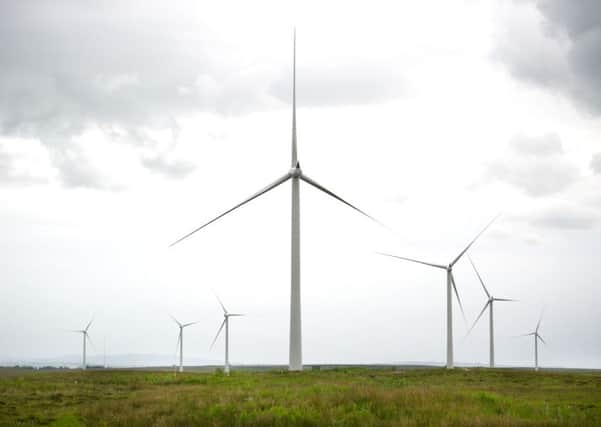Rethink end of wind sector subsidy, Tories urged


UK ministers announced last month that the current financial support scheme, known as the Renewables Obligation, would end a year earlier than planned – closing from April 2016.
The decision has caused an outcry in Scotland, with industry experts claiming £3 billion of investment could be lost and 3,000 jobs put at risk.
Advertisement
Hide AdAdvertisement
Hide AdSpeaking at an emergency summit to discuss the way forward when support is withdrawn, Jenny Hogan, director of policy at Scottish Renewables, urged the UK government not to abandon Scotland’s onshore wind sector by “pulling the rug from under it” earlier than expected.
She said: “Ending the Renewables Obligation one year early could have a devastating impact on onshore wind developers and the supply chain across the country, with around £3 billion of investment in Scotland being put at risk.
“We need UK ministers to urgently reconsider their position.
“The impact of this decision will be felt more harshly in Scotland because the biggest proportion of projects being developed in the UK is here.”
Scottish energy minister Fergus Ewing described the Tory plan as “anti-business” and claimed it would have far-reaching consequences north of the Border.
“All of this is will come at great personal and economic cost to our businesses and people,” he said.
“The impacts could spread right across Scotland and the wider supply chain, including ports and harbours, transmission and distribution, consultancy, communities and the civil engineering sector.”
He stressed that rural communities with limited employment opportunities would be among the hardest hit.
Advertisement
Hide AdAdvertisement
Hide AdScotland is home to more than 70 per cent of all onshore wind farms in the UK and accounts for around a third of the total renewables generation.
The most recent energy figures show almost half of the nation’s electricity use came from renewable sources last year, with wind delivering record levels of power in the first three months of 2015.
The Scottish Government has said it remains committed to achieving world-leading climate targets for 100 per cent of electricity demand to be met by renewables by 2020.
The UK Department of Energy and Climate Change (DECC) has said there will be “grace periods” for the sector, which could mean wind projects that have invested significant sums may still be able to go ahead. But Ms Hogan accused the government of a lack of clarity.
She said: “The details around exactly how a company may receive a grace period remains unclear. This lack of clarity is extremely damaging for investors.”
Mr Ewing said many successful businesses at the forefront of renewables technology were now being forced to consider making redundancies.
He added: “I also heard from investors both in Scotland and abroad who are wanting to invest in this industry but these are currently being stalled because of the uncertainty.”